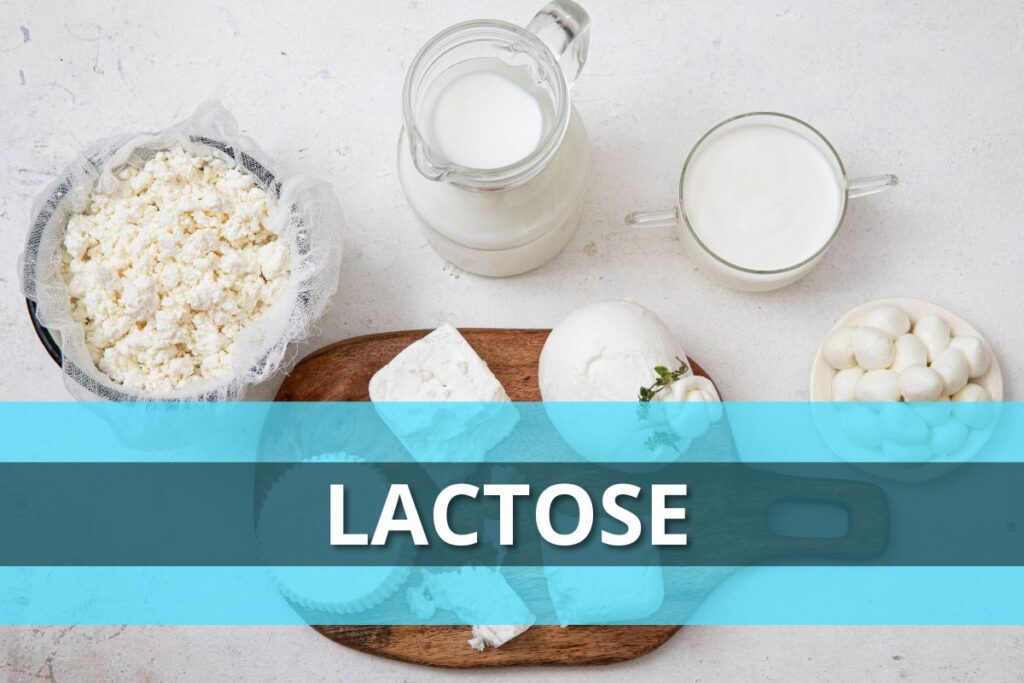Lactose

Not all athletes include cottage cheese and milk in their diet, especially if these foods cause certain unpleasant feelings in the gastrointestinal tract. This condition is called lactase insufficiency or intolerance of products containing lactose (lactose intolerance).
Let’s take a moment and discuss what lactose is. Lactose, or milk sugar, is 4-(β-galactopyranosido – β-galactopyranosido) -glucose. It is contained in milk in the amount of 4-5% and can be obtained from the whey of curdled skimmed milk after separating the cottage cheese, evaporating and crystallizing. Lactose is 4-5 times less sweet than sucrose. When exposed to enzymes in the body, lactose is split into D-galactose and D-glucose. Some organs of plants and animals often contain special enzymes, called lactase (lactase), which break down the milk sugar. Humans aren’t among those animals lucky enough to have this.
In fact, milk and lactose-containing products were invented by nature for children, since the amount of the digestive enzyme in a child’s system is contained in a sufficient amount for digestion! Breast milk is the only adequate food for children, especially in the first 6 months.
Further, nature has developed all organisms in different ways: someone has been fortunate to eat cheeses all of their life, while someone else has to pass because of insufficient amounts of lactase. Such conditions can have an innate nature, called primary lactase insufficiency, and acquired, or secondary lactase deficiency.

The secondary type may occur in athletes due to eating disorders and possible problems with the gastrointestinal tract. That is the reason why many people do not use dairy products in their diets.
In order to protect yourself from issues of lactose within your body, make sure that you read product labels. Very often this milk sugar can be hidden under such names as artificial butter flavor, butter, caramel color or flavoring, casein or caseinate, cheese, cream, dried milk, high protein flour, lactalbumin, lacitol (E966), lactose, lactoferrin, lactoglobulin, milk derivatives or powder or solids, natural flavoring, non-fat milk solids, whey, whey protein and whey solids concentrate.
🔻Maximum Performance Nutrition Program
Unlock your maximum potential with our Maximum Performance Nutrition Program. Tailored for weightlifters, this program offers serving-based diet planning, no food weighing required.
Perfectly complement your training for efficiency, body composition, competition prep, and weight class adjustments. Optimize performance, carbs, meal timing, and supplements.
Weightlifting Meal Plan Details:
- Easy step-by-step instructions;
- Serving control basis with no food weighing;
- Calorie intake is calculated for body mass;
- Adapts to your training schedule;
- Detailed guidance on progress tracking;
- Meal timing and serving sizes master tools;
- One-time payment for unlimited access.
Level up your game today!
There are even special departments in supermarkets with lactose-free products, but the problem is that even those products can cause symptoms from the gastrointestinal tract. Lactose in such products is not removed. The enzyme “lactase” is added to the product additionally, which helps to digest milk sugar.
If you suffer from lactase deficiency (although for adults is is now the norm), use other high-protein foods in your diet.
Related articles:
You might be interested in:
Why Trust Us?
With over 20 years in Olympic Weightlifting, our team does its best to provide the audience with ultimate support and meet the needs and requirements of advanced athletes and professional lifters, as well as people who strive to open new opportunities and develop their physical capabilities with us.
By trusting the recommendations of our certified experts in coaching, nutrition, dietology, and sports training programming, as well as scientific consultants, and physiotherapists, we provide you with thorough, well-considered, and scientifically proven content. All the information given in the articles concerning workout programming, separate exercises, and athletic performance, in general, is based on verified data. We ensure that you can rely on our professionals’ pieces of advice and recommendations that can be treated as personalized ones which will benefit you and fully meet your needs.
The product testing process is described in more detail here
Author: Sergii Putsov
Head of Sport Science, PhD
Best Results: Snatch – 165 kg,
C&J – 200 kg
Sergii Putsov, Ph.D., is a former professional weightlifter and National team member, achieving multiple medals in the 94 kg weight category at national competitions. With a Master’s degree in “Olympic & Professional Sport Training” and a Sport Science Ph.D. from the International Olympic Academy, Greece, Sergii now leads as the Head of Sport Science. He specializes in designing training programs, writing insightful blog articles, providing live commentary at international weightlifting events, and conducting educational seminars worldwide alongside Olympic weightlifting expert Oleksiy Torokhtiy.








